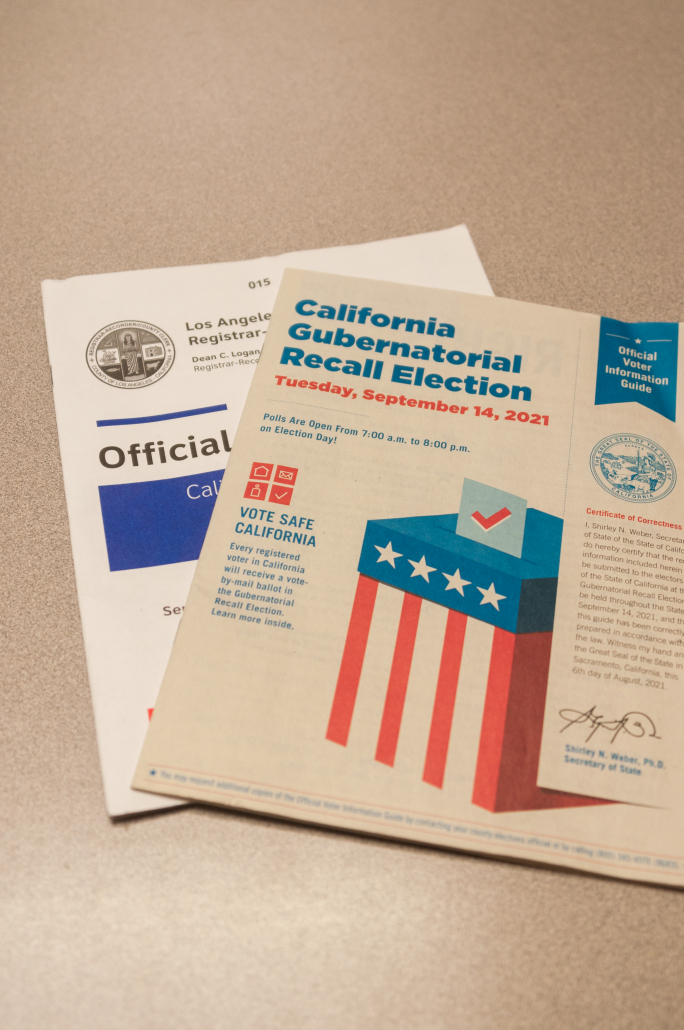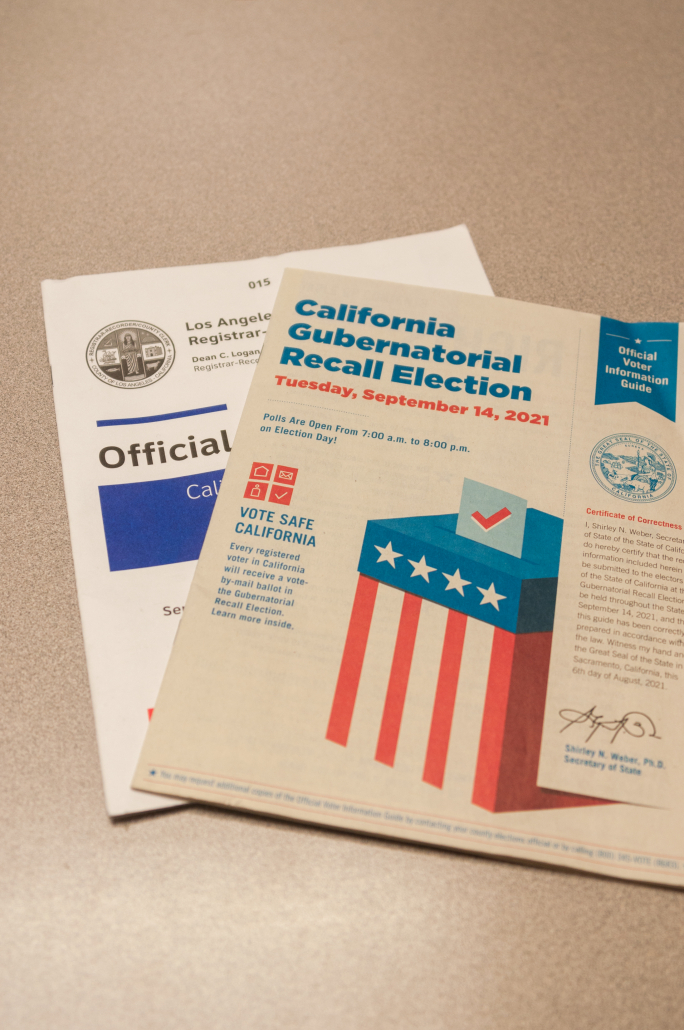
Ever since her childhood as a constituent to then-San Francisco Mayor Gavin Newsom, Sydney Brown looked up to the Democratic leader’s “progressive policies” — including his expansion of healthcare and his early support for gay marriage. Now, Brown spends the majority of her time registering local voters and attending anti-recall rallies in light of the upcoming recall election against the California Governor.
There are 46 candidates running to replace Newsom, including reality TV star Caitlyn Jenner, conservative talk show host Larry Elder and former San Diego Mayor Kevin Faulconer. In March, 1.7 million voters signed a petition to recall Newsom, meeting the state’s threshold needed to bring about a recall election. Many were motivated by anger towards the Governor for mandating mask wearing and imposing quarantines during the coronavirus pandemic.
According to the State Finance Department, the recall will cost California taxpayers approximately $276 million. If Senator Dianne Feinstein cannot continue to serve in the United States Senate before the winner of the next gubernatorial election enters office in 2023, the winner of the recall would also be the one to appoint her replacement.
Brown, who serves as president of the Trojan Democrats, organized events and ran weekly phone banks with Grassroots Democrats HQ since returning to school alongside fellow Trojan Democrats Sasha Hussain, Devin Martin and Nam Nguyen. The students also worked closely with the Stop the Republican Recall Campaign and the California Democratic Party to mobilize voters in support of Newsom before the Sept. 14 voting deadline.
Brown believes the recall election would create a “massive step backwards” for the historically “stalwart progressive state” of California.
“If Governor Newsom is recalled, instead of moving a country in the right direction, and being that source of inspiration for other communities across America, we’re going to move in the backwards direction on literally every single issue,” said Brown, a junior majoring in political science. “On civil rights, gay rights, women’s rights, climate change, economic stimulus pushes — on any given issue — we’re gonna move back and lose decades and decades of progress. That’s gonna hurt millions and millions of people in our state.”
Brown said Elder, one of the more prominent candidates in the election, promotes policies and beliefs she finds “scary” as an African American woman. Brown said she was particularly troubled by the Republican candidate’s past comments that Black people “exaggerate the significance of racism,” that women “exaggerate cases of domestic violence and cases of sexism” and that women workers become less valuable employees when they have children.
“[Elder] is somebody that believes that women are not as smart as men when it comes to politics and economics. That is something that he actually said. As a woman — especially a woman of color, studying politics — that is not okay,” Brown said. “Someone who’s going to potentially be put in a place of leadership in California is going to be someone who wouldn’t see me on the same level — at the very fundamental basic human rights level — as he would see himself. I think that that is heartbreaking.”
On Thursday, Brown and the Trojan Democrats hosted a student roundtable with California First Lady Jennifer Seibel Newsom. The USC College Republicans also plan to participate in a local recall event at the DoubleTree Hilton Hotel at the Ontario Airport from Sept. 10-12. According to the USC GOP’s website, volunteers will receive free room, board and drinks in return for assisting officials with campaign activities. The USC GOP did not respond to multiple interview requests from the Daily Trojan.
To engage with USC community members about the upcoming recall election, the Center for Political Future hosted the virtual event “To Recall or Not? Assessing the Campaign to Recall Gavin Newsom” on Sept. 1. CPF Co-Directors Bob Shrum and Mike Murphy moderated the discussion, which featured panelists Jennifer Cryer, assistant professor of political science and international relations; Carla Marinucci, senior writer for POLITICO’s California Playbook; Seema Mehta, a political writer for the Los Angeles Times; and Roger Salazar, a political strategist.
Murphy, a former consultant for prominent Republican politicians — including former Arizona Senator and Presidential Nominee John McCain and former Florida Governor Jeb Bush — reflected on his time as a senior strategist for former California Governor Arnold Schwarzenegger’s gubernatorial recall election in 2003, in which Schwarzenegger ousted Democrat Gray Davis with 48.6% of the vote.
Murphy said he believed there were valid reasons to recall Newsom, such as the California Employment Development Department’s 2020 corruption scandal involving tens of billions of dollars lost to fraudulent unemployment claims filed during the pandemic.
“If you’re not a progressive Democrat … there’s a lot to be upset about. This is a ‘big tax, big spend’ state. Those of us on the right don’t believe that’s best for the state or the people in it. There’s this unbelievable scandal at the EDD — [$31] billion in fraud — and the Governor’s spoken about that for maybe two paragraphs,” Murphy said. “That’s a pretty legit critique of him from the right. I think there are gonna be conservative [Decline to State] voters who vote against him on that — not only on [the coronavirus].”
Although he voted for Kevin Faulconer, Murphy said he did not expect a successful outcome for any of the Republican candidates because of the small number of conservative voters in the state.
In an interview with the Daily Trojan, CPF Executive Director Kambiz Akhavan, said he felt that political polarization has played a strong role in the recall election.
“Polarization is making people who want the governor out very motivated. They listen to their friends, their social circles — their media is telling them he’s doing a bad job, and they believe it, and they want to get him out,” Akhavan said.
Akhavan also said the decline in “places where people congregate physically,” such as churches, retail malls, concerts and unions contributes to polarization.
“There’s less opportunity for interaction, more opportunity for division. It’s really pushing us apart,” Akhavan said.
Brown also shared concerns about political division: “Everything we see in the news is about polarization … There’s a lot of really extreme opinions being felt by everyone right now. I feel like it’s really impacting this election.”
“I think hosting perhaps meetings with groups like [the Trojan Democrats] and the USC GOP is the first step towards really understanding the other side of the aisle, seeing where they’re coming from, why they might hold the views that they do,” Brown said. “From there, we can go on and have a more productive and kind of dialogue, as opposed to something that is a bit volatile.”








